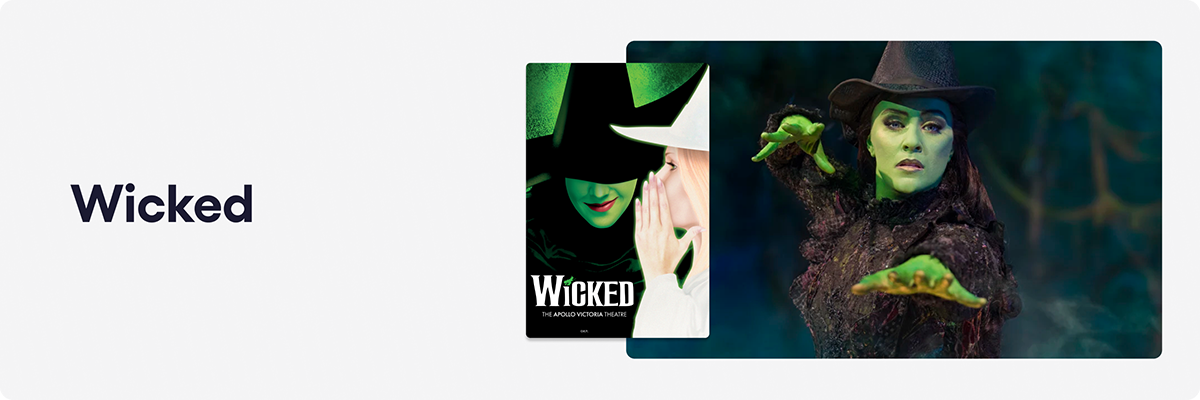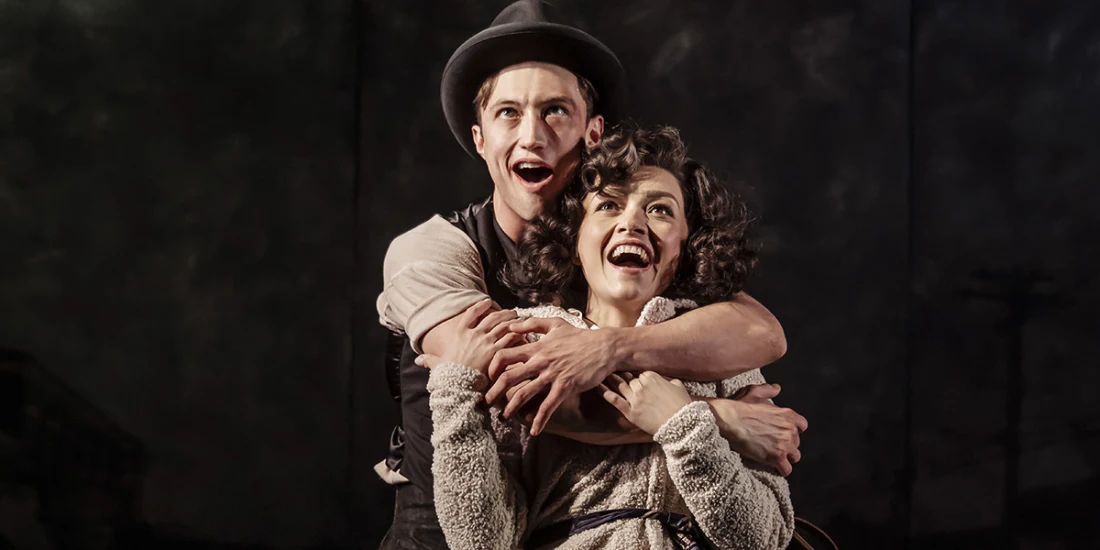A complete guide to all the songs in 'Bonnie & Clyde'
Frances Mayli McCann and Jordan Luke Gage reprise their roles as the title partners in crime at the Garrick Theatre, for 11 weeks only beginning on 4 March.
The outlaws are back in town. After concerts at Theatre Royal Drury Lane, and an acclaimed season at the Arts Theatre, Bonnie & Clyde returns to the West End's Garrick Theatre for 11 weeks. Olivier Award-nominee Frances Mayli McCann and Jordan Luke Gage reprise their roles as Bonnie and Clyde, respectively, from a 2022 production.
Bonnie & Clyde tells the story of two notorious American criminals who rose to fame in the 1930s, at the height of the Great Depression, when the American Dream felt unattainable. The musical explores what led Bonnie and Clyde to their life of crime, presenting these antiheroes as two lovebirds desperate to break out of poverty and make their mark on the world.
The London Theatre review of the West End production noted, "Bonnie’s fatalism, in McCann’s expert hands, makes for feverishly exciting theatre."
The musical premiered on Broadway in 2011 and received a 2012 Tony Award nomination for Best Original Score. In years since, the show has cultivated a dedicated fan base – largely thanks to its songs by Frank Wildhorn (music) and Don Black (lyrics).
The titular duo’s star power shines through in the show’s songs, infused with an eclectic mix of American country, rock, gospel, and blues. With the return engagement just around the corner, now is a perfect time to revisit the Bonnie & Clyde score. Get ready to raise a little hell and book tickets to see Bonnie & Clyde at the Garrick Theatre.
"Prologue: How ‘Bout a Dance?"
The first strains of music in Bonnie & Clyde are instrumental notes from an old-fashioned car radio. This haunting tune resurfaces throughout the show, primarily as a love song. But in this prologue, it is a chilling accompaniment to the gunshots that kill the show’s title characters.
The final image of the prologue features the bodies of Bonnie Parker and Clyde Barrow, bloody and lifeless in the car. We know their gruesome end before their story has even begun.
"Picture Show"
Twelve years earlier, a young Bonnie dreams of becoming a rich and fashionable star — “the main attraction at the picture show like Clara Bow.” Actress Clara Bow rose from poverty to become the original “It Girl” and the inspiration for Betty Boop. But her glamorous life was not as wonderful as it seemed — a warning for Bonnie, perhaps. Bow famously said, “All the time the flapper is laughing and dancing, there’s a feeling of tragedy underneath.”
Meanwhile, a young Clyde yearns to be an outlaw like his hero Billy the Kid, a notorious 19th-century gunfighter in the American West. Like Billy, Clyde proclaims, “Ain’t nothing I can’t do with a gun.”
As he grows up, he graduates from stealing bicycles to stealing cars. His new hero is gangster Al Capone, who made millions controlling Chicago’s organised crime scene as The Bootlegging King during Prohibition.
"The World Will Remember Me"
Clyde escapes from jail and rejects the dismal life of “the homeless and the hungry” law-abiding citizens who “talk about foreclosures every hot and dusty day.” He is sure he will strike it rich as a robber. He promises Bonnie satin dresses and a penthouse and convinces her to run away with him.
Unlike in “Picture Show,” in which Bonnie and Clyde sing apart in their separate worlds, “The World Will Remember Me” sees the pair sing to each other for the first time.
"You’re Going Back to Jail"
Clyde’s brother Buck broke out of jail with him, but Buck’s wife, Blanche, wants him to return. A devout Christian, she believes Buck can serve the rest of his sentence and then turn over a new leaf in the eyes of God and society.
"How ‘Bout a Dance?"
When Bonnie reveals she wants to be a famous actress and singer, Clyde flirtatiously persuades her to sing something for him. She chooses this song, which was written for the show, but represents popular love songs of the time.
As in many of those tunes, dancing is a metaphor for courtship, if not sex. “You’ll lose the blues, and you may lose your heart,” the lyric seductively promises.
"When I Drive"
Although Buck promises Blanche he will return to prison, Clyde thinks his brother will go on the run with him and Bonnie. Clyde and Buck bask in the freedom that awaits them on the open road. When they drive away, they’ll feel powerful, heroic, and in control. Clyde is serious about skipping town, but for Buck, it’s just a fantasy to briefly indulge before he turns himself in.
"God’s Arms are Always Open"
Blanche and Buck go to church, where a preacher baptises Buck before a sheriff handcuffs him. The preacher leads his congregation in a gospel hymn about God’s love and forgiveness. As they sing with increasing fervour, Clyde returns to his life of crime. At the song's end, the sheriff captures Clyde, too, and hauls him back to jail.
"You Can Do Better Than Him"
Deputy sheriff Ted Hinton believes Bonnie is too good for Clyde and admits he loves her. From his prison cell, Clyde acknowledges Bonnie could find a respectable man — presumably someone like Ted. But Ted and Clyde are convinced no one could ever love Bonnie as much as they do.
Ted Hinton was an actual deputy sheriff who knew Bonnie and Clyde before they became outlaws. In his book Ambush, he admits he had a crush on Bonnie. Because he could identify the pair, Hinton was selected as part of the team that ultimately would ambush and kill them.
"You Love Who You Love"
Bonnie tells her mother she loves Clyde despite his bad reputation, and they argue. “I wouldn’t change him if I could. No man’s all good.” In contrast, Blanche thought she’d be able to change Buck. But both women are adamant in their love for their men; perhaps they even became attracted to them because of their wild streak. Blanche’s lyrics in this song are partly inspired by her memoir, My Life with Bonnie and Clyde.
"Raise A Little Hell"
Clyde is sentenced to 16 years in prison. It is unbearable. “I’ve been broken by the devil,” he wails. “Justice is a waste of time.” Desperate to escape, he tells Bonnie where to find a gun. He also plans to kill a prisoner who assaulted him. Clyde’s focus turns from robbery to murder.
"The World Will Remember Us"
Bonnie smuggles a gun into the jail and helps Clyde break out. Despite his promises to the contrary, he immediately plans to return to a life of crime and finally become the next Al Capone.
Bonnie wants to go to Hollywood, but Clyde gets her to help him pull a few jobs first. As their notoriety increases, Bonnie is enthralled by the fame. Act 1 ends with Bonnie and Clyde becoming “living legends” — criminals making their mark on the world.
"Made in America"
Fans of Wildhorn’s Jekyll and Hyde might recall the social commentary in the ensemble number “Façade.” This Act 2 opener similarly offers a societal critique, examining what happens when the American Dream is beyond reach.
The triple rhyme scheme in the chorus underscores how trapped the characters must feel: “We may be in debt, wake up in a sweat, but let’s not forget we were made in America.” The preacher condemns Bonnie and Clyde, but many others sympathise with their choice to steal, suggesting the pair is a product of their time and their country.
"Too Late to Turn Back Now"
When a robbery goes awry, Clyde ends up killing a cop. Bonnie panics. She tries to leave Clyde and finally head out to Hollywood. But he tells her it’s too late to turn back. Bonnie resigns herself to staying with Clyde and continuing a life of crime.
"That’s What You Call a Dream"
Buck is tempted by news of his brother’s wealth and exploits. But Blanche rejects that version of the American Dream. She explains she doesn’t need money or fame. Her dream is simple — a quiet family life with her husband.
"What Was Good Enough"
Clyde slips back home to visit his parents. Although they are dismayed by what their son has become, they are desperate enough to accept the money he gives them. Clyde repudiates the values of his hardworking, farmer father, while Bonnie dismisses her mother’s domestic world. “The Bible has got it wrong,” a jaded Clyde sings to Bonnie, “the meek don’t inherit a thing.”
"Bonnie"
Clyde has written a love song for Bonnie, which he sings for her while accompanying himself on a ukulele. In real life and the show, Bonnie is an amateur poet. In Act 1, she writes a poem about Clyde when they first get together. Much of her dialogue here mirrors Clyde’s reaction to that poem.
"Raise a Little Hell (Reprise)"
Despite Blanche’s protests, she and Buck join Bonnie and Clyde. They are now the Barrow Gang. The men break into an armory and steal a cache of weapons, including automatic rifles. Their crimes escalate. A detective and a sharpshooter help the sheriff and Ted track down the gang.
"Dyin’ Ain’t So Bad"
Wildhorn is known for his dramatic ballads — this song is Bonnie and Clyde’s. It’s also the eleven o’clock number (a showstopping song in the second half of a musical). By this point, Clyde will inevitably be caught and killed. Blanche encourages Bonnie to leave and save herself. She refuses. Bonnie is not afraid of dying as long as she and Clyde die together.
"God’s Arms Are Always Open (Reprise)"
The remaining songs in the show are all reprises, starting with a reprise of the gospel hymn. The sheriff’s team discovers the Barrow Gang’s hiding spot. Bonnie and Clyde escape, but Buck is shot. He dies in the arms of a heartbroken Blanche. She is subsequently arrested for aiding and abetting the fugitives.
"You Can Do Better Than Him (Reprise)"
Ted realises it is too late for him to save Bonnie. When she and Clyde try to drive home to see their families, they will both be shot. He struggles to reconcile who Bonnie has become with his memories of the seemingly innocent schoolgirl he loved.
"Picture Show (Reprise)"
Bonnie and Clyde’s younger selves reappear and sing about their childhood dreams of being like Clara Bow and Al Capone, respectively.
"Dyin’ Ain’t So Bad (Reprise)"
Clyde feels responsible for his brother’s death. He doesn’t know how he will be able to face his parents. Bonnie comforts him by sharing a poem she wrote about their exploits, which morbidly (but presciently) ends with the two of them dying together. The actual Bonnie Parker wrote this poem, called "The Story of Bonnie and Clyde."
"How ‘Bout a Dance? (Reprise)"
The song heard in the prologue plays again in the finale, as Bonnie and Clyde drive off on a fateful trip to see their families, which ends in their ambush and demise. Bonnie got her wish; the two die together. In the original Broadway production, pictures of the dead outlaws were projected onto a scrim as Bonnie sang the show’s final lines. “You’ll lose the blues, and you may lose your heart.”
Book Bonnie & Clyde tickets on London Theatre.
See more shows in the West End
Book Mamma Mia! tickets on London Theatre.

Book Wicked tickets on London Theatre.
Photo credit: Bonnie & Clyde (Photo courtesy of production)
Originally published on


